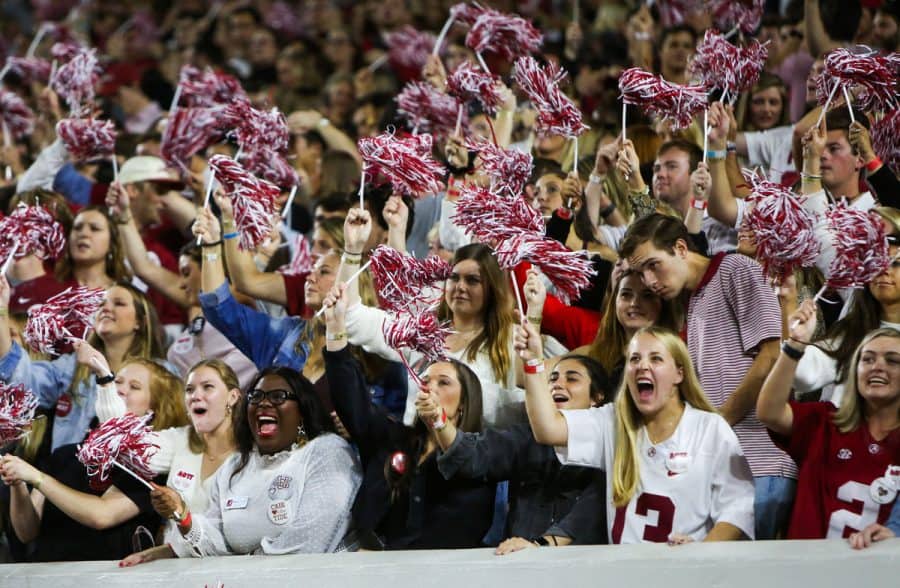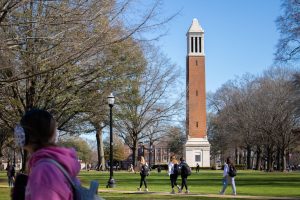SGA members criticize block seating program
Two SGA members found that 76% of block seating was granted to Greek organizations in 2019.
July 10, 2021
UPDATE by Zach Johnson on Tuesday, July 13. SGA Senator for the College of Arts and Sciences John Dodd launched a petition on Tuesday calling for the abolition of block seating at UA football games.
“Ultimately, block seating needs to be removed because of the inequitable process and policies, as well as the discrimination towards those not in Greek Organizations, women, those with less disposable income, and people of color,” Dodd wrote.
Dodd, who campaigned on an anti-Machine platform last year, criticized the selection process for Board of Governors members.
“It’s an unregulated process where applicants are selected by SGA executives who are directly affiliated with the extremely racist political Machine on our campus,” Dodd wrote.
As football season approaches, two SGA members and College of Arts and Sciences Senator John Dodd are questioning the equity of the block seating program.
Block seating allows student organizations to apply for a “block” or a few rows of seats designated for their members during home games. These seats can only be filled by members of the organizations who are awarded a block for the season. Blocks are located behind the end zone at the south end of Bryant-Denny Stadium, in sections S1-S7.
SGA members Garrett Burnett and Sarah Shield analyzed demographic data of student organizations that received block seating in 2019. Burnett and Shield concluded that the University’s block seating system is discriminatory and unfair. They said block seating needs to be eliminated immediately.
“In a perfect world, block seating is gone and everyone just has the same opportunity,” Shield said.
Block seating will return in the fall after a season-long absence. Stadium capacity was reduced to 20% last season to follow COVID-19 guidelines. Last year, students with tickets to home games filled the stadium on a first-come, first-served basis while maintaining social distancing guidelines.
However, Burnett and Shield claim that block seating isn’t beneficial to the majority of the campus community and instead caters to members of Greek organizations. By studying the block seating maps, they said it is easy to recognize inequity within the system.
Shield said the maps revealed gender and financial disparities and favored Greek organizations. They gathered data from the most recent block seating chart from 2019 and found that 76% of the allotted blocks were Greek-letter organizations.
That year, the largest block was for student-athletes, who occupied rows 31-46 of section S3. Greek-letter organizations accounted for 175 rows of the block seating section, or 72% of available seats. Fraternities occupied more than half of the rows.
One block, equivalent to 2% of block seating, was occupied by Alpha Phi Alpha of the National Pan-Hellenic Council, which includes eight historically Black fraternities and sororities. Alpha Phi Alpha is the only NPHC chapter that received a block.
The data also revealed financial inequality. Since Greek organizations hold 72% of the blocks, Shield and Burnett said the high cost of membership in a Greek organization limits other students’ access to block seating.
According to Shield and Burnett, the average cost to be a member of the Greek block is $3,386.42 per season. The average cost for one student ticket in 2020 was $20.
Shield and Burnett said every student should have equal access to a great seat during the season, and removing block seating is the best way to achieve this. They proposed that the first-come, first-served system used last year would work just as well in future seasons.
“Taking away block seating is the only way to ensure that kind of equal experience for everyone. I don’t think anyone loses by it being taken away because you still have the opportunity to sit in the same exact seats,” Shield said. “But on the other hand, if we take it away, a lot of students stand to gain from that decision.”
Shield and Burnett’s analysis criticized the scoring rubric used to award block seating. Organizations can obtain up to 1.5 times more seats than the total number of GPAs they submit with their applications. Organizations with more members have more GPAs to pick from.
This allows organizations to submit the highest GPAs among their members and receive enough seating for the organization.
The scoring rubric, provided by the SGA and the Office of Student Affairs, includes three categories that are weighted for evaluation. Professionalism accounts for 30% of the score, GPA is 50% and a packet demonstrating leadership, diversity, education, community service and philanthropy is 20%.
The Board of Governors , which is composed of students who are selected through a separate SGA application process, judges the application. The Board’s responsibilities include reviewing applications, scoring presentations and assigning sections to organizations.
“Due to the demographics of the overwhelming majority of predominantly white Greek organizations that sit in the very front row of the block seating … it’s just hard to see it as equitable or equal at all,” Dodd said.
He emphasized the irony in diversity having been listed as an evaluation factor when so many of the blocks are given away to homogenous groups on campus.
“I just don’t think there’s anything diverse about the Kappa Alpha Order at The University of Alabama,” Dodd said.
Steven Hood, senior associate vice president for student life, said that student organization seating is open to all SOURCE-registered groups on campus and can be applied for using a multi-step system.
“For organizations that wish to pursue Student Organization Seating, organization representatives must review the process that is sent through electronic communication and posted to the website,” Hood said. “Organization representatives must then complete a Qualtrics survey to opt in for the process and to acknowledge the rules for the process moving forward.”
Following the Qualtrics survey, groups complete a contract and submit a blinded application packet, which Hood said allows for objective reviews. Student organizations are then invited to complete interviews conducted by the Board of Governors in August.
Hood said block seating is a great way for students involved in SOURCE-registered organizations to sit together during games.
“The Division of Student Life works to support the SGA in facilitating a fair and consistent process for Student Organization Seating,” Hood said. “We encourage any students who have an interest in this process to share their thoughts on how to best improve the process.”
Burnett and Shield expressed disappointment with the SGA and UA administration for not acknowledging their findings. Their attempts to share their work with administrators have been met with frustration. They said it felt like they had to explain block seating to administrators even though these administrators have “definitely worked on [block seating] before and made changes.”
Their hope for this year is that the SGA and UA administration will show interest in remedying the situation instead of “sweeping it under the rug.”










